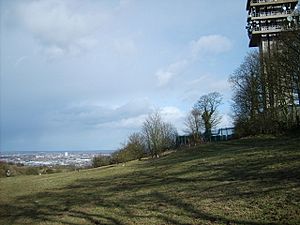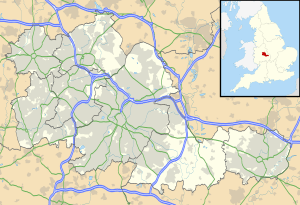Rowley Hills facts for kids
Quick facts for kids Rowley Hills |
|
|---|---|

View from transmission tower on Turner's Hill
|
|
| Location | near Dudley, West Midlands |
| OS grid | SO 966 887 |
| Coordinates | 52°29′47″N 2°3′0″W / 52.49639°N 2.05000°W |
| Highest point – elevation |
Turner's Hill 269 metres (883 ft) |
| Geology | Rowley Rag |
| Age | Carboniferous |
The Rowley Hills are a group of hills found in the West Midlands area of England. This group includes hills like Turner's Hill, Bury Hill, Portway Hill, and Darby's Hill. These hills act like a natural dividing line for water. Rain that falls on the west side flows into the River Severn and eventually reaches the Bristol Channel. Rain on the east side goes into the River Trent and then into the North Sea. The hills are located just east of Dudley, right on the edge of the Dudley and Sandwell areas.
Contents
Exploring the Rowley Hills
The Rowley Hills are a well-known feature in the West Midlands. They offer great views and are important for local wildlife. People enjoy visiting them for walks and to see the landscape.
Turner's Hill: The Highest Point
The biggest hill in the group is Turner's Hill. It is the highest point in the entire West Midlands, reaching about 269 meters (883 feet) above sea level. From the top, you can see many famous places. These include the Clee Hills, the Clent Hills, and Cannock Chase. You can also see large parts of Birmingham and the Black Country. Because it's so high, two radio towers have been built on its summit. These towers help send radio signals across the region.
Portway Hill: A Nature Reserve
Portway Hill is another important part of the Rowley Hills. It is home to a special nature reserve. This reserve is looked after by the Wildlife Trust for Birmingham and the Black Country. It helps protect local plants and animals. Nature reserves are important places where wildlife can live safely.
Rowley Rag: A Special Stone
The Rowley Hills are famous for a type of stone called Rowley Rag. This stone is a form of Dolerite. In the past, this stone was dug out of the hills from quarries. It was often used to make things like kerbstones, which are the edges of pavements along roads.
History of the Hills
Over many years, people have lived around the Rowley Hills. The village of Rowley has had four churches built there over time. All of them have been named St. Giles. These churches show the long history of people living and worshipping in this area.
 | Emma Amos |
 | Edward Mitchell Bannister |
 | Larry D. Alexander |
 | Ernie Barnes |


